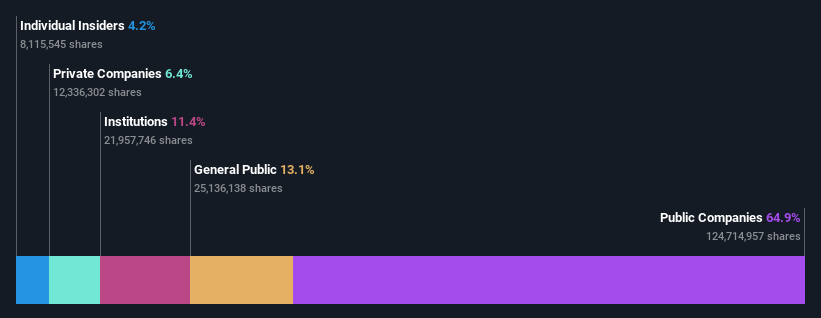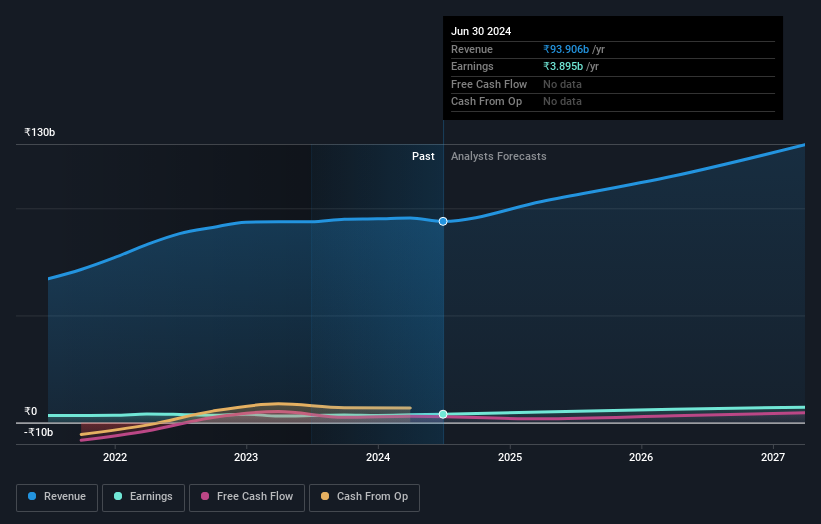Public companies among Godrej Agrovet Limited's (NSE:GODREJAGRO) largest stockholders and were hit after last week's 4.5% price drop

Key Insights
- Significant control over Godrej Agrovet by public companies implies that the general public has more power to influence management and governance-related decisions
- Godrej Industries Limited owns 65% of the company
- Institutional ownership in Godrej Agrovet is 11%
If you want to know who really controls Godrej Agrovet Limited (NSE:GODREJAGRO), then you'll have to look at the makeup of its share registry. The group holding the most number of shares in the company, around 65% to be precise, is public companies. Put another way, the group faces the maximum upside potential (or downside risk).
As a result, public companies as a group endured the highest losses last week after market cap fell by ₹6.7b.
In the chart below, we zoom in on the different ownership groups of Godrej Agrovet.
See our latest analysis for Godrej Agrovet

What Does The Institutional Ownership Tell Us About Godrej Agrovet?
Institutions typically measure themselves against a benchmark when reporting to their own investors, so they often become more enthusiastic about a stock once it's included in a major index. We would expect most companies to have some institutions on the register, especially if they are growing.
Godrej Agrovet already has institutions on the share registry. Indeed, they own a respectable stake in the company. This can indicate that the company has a certain degree of credibility in the investment community. However, it is best to be wary of relying on the supposed validation that comes with institutional investors. They too, get it wrong sometimes. When multiple institutions own a stock, there's always a risk that they are in a 'crowded trade'. When such a trade goes wrong, multiple parties may compete to sell stock fast. This risk is higher in a company without a history of growth. You can see Godrej Agrovet's historic earnings and revenue below, but keep in mind there's always more to the story.

We note that hedge funds don't have a meaningful investment in Godrej Agrovet. Our data shows that Godrej Industries Limited is the largest shareholder with 65% of shares outstanding. This essentially means that they have extensive influence, if not outright control, over the future of the corporation. For context, the second largest shareholder holds about 4.7% of the shares outstanding, followed by an ownership of 2.7% by the third-largest shareholder. Additionally, the company's CEO Balram Yadav directly holds 1.5% of the total shares outstanding.
Researching institutional ownership is a good way to gauge and filter a stock's expected performance. The same can be achieved by studying analyst sentiments. There are plenty of analysts covering the stock, so it might be worth seeing what they are forecasting, too.
Insider Ownership Of Godrej Agrovet
The definition of an insider can differ slightly between different countries, but members of the board of directors always count. Company management run the business, but the CEO will answer to the board, even if he or she is a member of it.
Insider ownership is positive when it signals leadership are thinking like the true owners of the company. However, high insider ownership can also give immense power to a small group within the company. This can be negative in some circumstances.
Shareholders would probably be interested to learn that insiders own shares in Godrej Agrovet Limited. This is a big company, so it is good to see this level of alignment. Insiders own ₹6.0b worth of shares (at current prices). Most would say this shows alignment of interests between shareholders and the board. Still, it might be worth checking if those insiders have been selling.
General Public Ownership
With a 13% ownership, the general public, mostly comprising of individual investors, have some degree of sway over Godrej Agrovet. This size of ownership, while considerable, may not be enough to change company policy if the decision is not in sync with other large shareholders.
Private Company Ownership
Our data indicates that Private Companies hold 6.4%, of the company's shares. Private companies may be related parties. Sometimes insiders have an interest in a public company through a holding in a private company, rather than in their own capacity as an individual. While it's hard to draw any broad stroke conclusions, it is worth noting as an area for further research.
Public Company Ownership
Public companies currently own 65% of Godrej Agrovet stock. We can't be certain but it is quite possible this is a strategic stake. The businesses may be similar, or work together.
Next Steps:
It's always worth thinking about the different groups who own shares in a company. But to understand Godrej Agrovet better, we need to consider many other factors. Case in point: We've spotted 2 warning signs for Godrej Agrovet you should be aware of.
If you are like me, you may want to think about whether this company will grow or shrink. Luckily, you can check this free report showing analyst forecasts for its future.
NB: Figures in this article are calculated using data from the last twelve months, which refer to the 12-month period ending on the last date of the month the financial statement is dated. This may not be consistent with full year annual report figures.
New: Manage All Your Stock Portfolios in One Place
We've created the ultimate portfolio companion for stock investors, and it's free.
• Connect an unlimited number of Portfolios and see your total in one currency
• Be alerted to new Warning Signs or Risks via email or mobile
• Track the Fair Value of your stocks
Have feedback on this article? Concerned about the content? Get in touch with us directly. Alternatively, email editorial-team (at) simplywallst.com.
This article by Simply Wall St is general in nature. We provide commentary based on historical data and analyst forecasts only using an unbiased methodology and our articles are not intended to be financial advice. It does not constitute a recommendation to buy or sell any stock, and does not take account of your objectives, or your financial situation. We aim to bring you long-term focused analysis driven by fundamental data. Note that our analysis may not factor in the latest price-sensitive company announcements or qualitative material. Simply Wall St has no position in any stocks mentioned.
About NSEI:GODREJAGRO
Godrej Agrovet
An agri-business company, provides products and services that enhance crop and livestock yields in India and internationally.
High growth potential with solid track record and pays a dividend.


